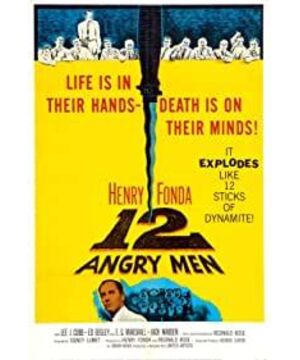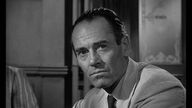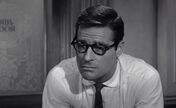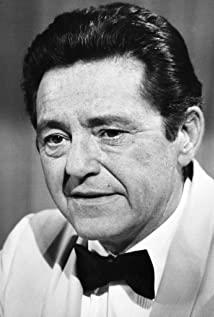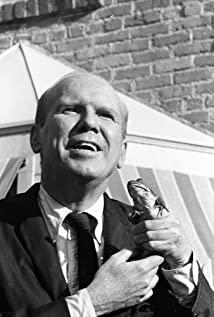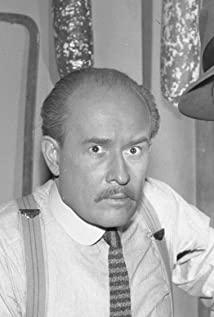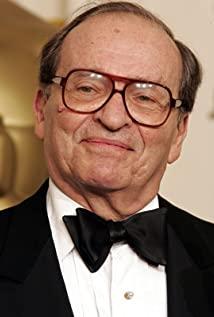1. If the whole world thinks that the earth is the center of the universe, would you dare to be Bruno?
If everyone believes that Qin Shihuang is a good emperor, would you dare to rewrite history?
If eleven of the twelve people think you are a murderer, will you be sent to the electric chair?
2. Plot:
Describes a New York youth accused of killing his father and will be sentenced to the death penalty of first-degree murder. Eleven jurors have already found the suspect guilty, and only one (Juror No. 8) felt that the situation was suspicious and insisted on raising objections, and with patience and perseverance, he persuaded the other jurors to overturn the original intention. Finally, this case was almost completely overturned. The verdict of an unjust case was rehabilitated.
3. Reasons for recommendation:
A. The movie itself: The scene of the movie is monotonous and bizarre-there is only one scene in the whole movie, which is a jury lounge, and the small toilet next to it will not exceed 40 square meters! Almost all the plots of the entire movie in one and a half hours took place here. The 12 people serving as the jury in this case must discuss the case with the jury lounge before the case is closed, and must always pass whether the suspect is guilty before the case can be officially closed. This movie is the whole process of discussion from the 11:1 finding that the suspect is guilty to 12 people all finding him not guilty. Excellent acting skills, wonderful dialogues, clever switching, all in one go, the touch of the heart makes people look at the ups and downs, invigorating and refreshing, just one word.
B. Behind the movie:
I. Regarding the jury system: Homicide is a criminal case. For criminal cases, in criminal judgments, the prosecution’s duty is to prove beyond a reasonable doubt to prove beyond a reasonable doubt. Only then can the court convict the defendant. The defense can be exonerated as long as it can prove that there is a reasonable doubt. As for the prosecution and the defense after they have presented the argument, analyzed the evidence, and asked the witness
Is there a reasonable possibility that the suspect is innocent? As long as there is such a possibility, he cannot be convicted. Who will define whether such a possibility exists in the end? jury! Throughout the film, juror No. 8 repeatedly emphasized that I don’t know whether the suspect killed anyone, we don’t know, and it’s impossible to know exactly. But our job is not this. Our job is to find out whether there is such a possibility that the suspect is innocent. As long as this possibility exists, we should acquit him.
II. Regarding discussion and truth:
"This film tries to show people that (under rational conditions) various opinions can be reached through full discussion and argumentation and reach a consensus, and focus on the objective truth." The process from the absolute disadvantage of eleven people to the final comprehensive others does not rely on force, not authority, but rules. There are two rules, one is logic rule, and the other is system rule.
The other eleven people have different backgrounds. At the beginning, the audience
felt that some of them were "reasonable" and some were "unreasonable". At the end, when you think about it, those who are "unreasonable" are also It is still reasonable, at least in the discussion, abide by the basic rules of logic, and demonstrate the arguments through arguments. If you want to prove that my argument is wrong, you can point out that my argument is inconsistent with the facts. My argumentation is not rigorous and the conclusion of my argument is unscientific. If you can't refute me to all of these, then you should only agree with me. For an
argument, I can’t distort my argument with a secret exchange of concepts, and then pull other people’s arguments to the point. In the end, I can’t say anything and then refuse to admit it or ignore it. Juror No. 8 put forward reasonable hypotheses one after another, questioning the evidence presented by the prosecution one after another. Every time he puts forward a hypothesis, someone must first refute him, but when he proves his hypothesis is reasonable, the other party again When no rebuttal can be found, the other party will give up the previous guilty verdict and tend to be acquitted. Isn't this "reasonable"?
The second rule is the system rule, and the specific one here is the voting system. To determine guilty or innocence, it must be passed unanimously, and "no one less vote". The voting process is a concrete manifestation of each juror's performance of his duties as a jury. In this movie, the opinions of many jurors are changing, and some even change back and forth. But the way of expressing their opinions has never changed, vote! Just started to discuss the bottom line, vote, 1:11. Persuade one and vote again: 2:10. Propose a hypothesis, prove one, and vote again, 3:10. . . Until the last 11:1, 12:0, lip-fights were constantly happening, but everyone’s respect for one vote per person is always consistent, and I won’t say that in terms of quantity, we are now 11:1, yours. That vote does not count; in terms of quality, I think you are stupid than me. Your vote should only be counted as half, or even 0.1. One person, one vote, and each vote is equal. This is another rule.
Logic and system, it is these two rules that ensure that the minority can persuade the majority, and a group can reach a consensus based on what they see and approach the objective truth.
View more about 12 Angry Men reviews


